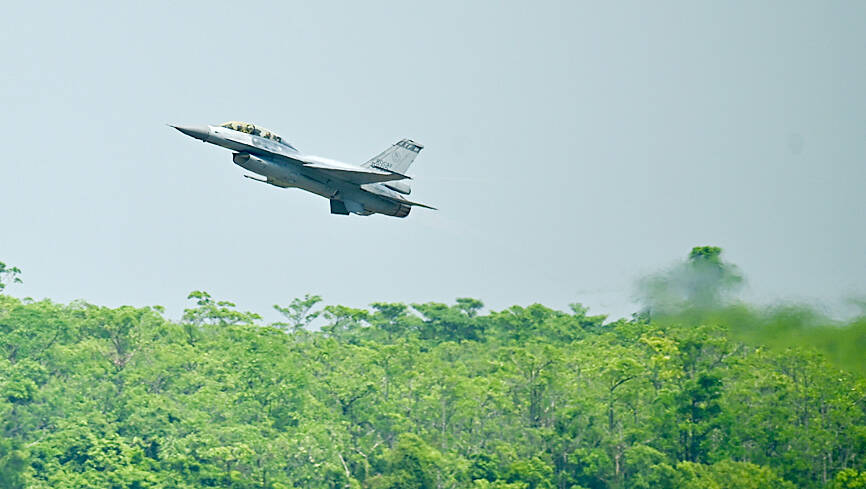The US Department of State has approved the sale of US$228 million of military goods and services to Taiwan, the US Department of Defense said on Monday.
The state department “made a determination approving a possible Foreign Military Sale” to the Taipei Economic and Cultural Representative Office in the US for “return, repair and reshipment of spare parts and related equipment,” the defense department’s Defense Security Cooperation Agency said in a news release.
Taiwan had requested the purchase of items and services which include the “return, repair and reshipment of classified and unclassified spare parts for aircraft and related equipment; US Government and contractor engineering, technical and logistics support services; and other related elements of logistics and program support,” the statement said.

Photo: Lo Pei-de, Taipei Times
“The sale is consistent with US law and policy as expressed in Public Law 96-8,” the release said, referring to the Taiwan Relations Act.
The US Congress, which is expected to approve the sale, has already been notified, the agency said.
In Taipei, the Ministry of Foreign Affairs thanked the US government for “upholding Taiwan’s safety in accordance to the Taiwan Relations Act and the ‘six assurances.’”
The Ministry of National Defense also expressed its gratitude for the approved purchase.
“The Chinese Communist Party’s normalization of gray zone intrusions are putting pressure on training space and reaction times in Taiwanese waters and airspace,” the defense ministry said in a statement.
The aviation-related goods and services “will help maintain the combat readiness and safety of various types of aircraft equipment of our air force,” it added.
It is the 16th time that US President Joe Biden’s administration has authorized the sale of military goods and services to Taiwan, the defense ministry said.
Presidential Office spokesperson Karen Kuo (郭雅慧) said in a statement that the sale reflects the importance placed by the Biden administration on peace and stability in the Taiwan Strait, and the continued implementation of US security commitments to Taiwan.
The Presidential Office backed up the defense ministry’s comment by saying that the sale would help maintain the combat readiness of the air force to deal with “normalized gray zone intrusions” by the Chinese People’s Liberation Army (PLA).
Meanwhile, a US Navy aircraft flew through the Taiwan Strait yesterday in what the US called a show of commitment to free and open international airspace, prompting China to scramble fighters.
“By operating within the Taiwan Strait in accordance with international law, the United States upholds the navigational rights and freedoms of all nations,” the US 7th Fleet said of the P-8A Poseidon’s flight.
The Eastern Theater Command of the PLA said jets were scrambled to monitor and “alert” the US aircraft.
Last week, two German navy ships sailed through the Taiwan Strait in the first such transit in two decades in a show of Berlin’s resolve to stand with Western allies over Taiwan.
Additional reporting by Reuters

CHAOS: Iranians took to the streets playing celebratory music after reports of Khamenei’s death on Saturday, while mourners also gathered in Tehran yesterday Iranian Supreme Leader Ayatollah Ali Khamenei was killed in a major attack on Iran launched by Israel and the US, throwing the future of the Islamic republic into doubt and raising the risk of regional instability. Iranian state television and the state-run IRNA news agency announced the 86-year-old’s death early yesterday. US President Donald Trump said it gave Iranians their “greatest chance” to “take back” their country. The announcements came after a joint US and Israeli aerial bombardment that targeted Iranian military and governmental sites. Trump said the “heavy and pinpoint bombing” would continue through the week or as long

TRUST: The KMT said it respected the US’ timing and considerations, and hoped it would continue to honor its commitments to helping Taiwan bolster its defenses and deterrence US President Donald Trump is delaying a multibillion-dollar arms sale to Taiwan to ensure his visit to Beijing is successful, a New York Times report said. The weapons sales package has stalled in the US Department of State, the report said, citing US officials it did not identify. The White House has told agencies not to push forward ahead of Trump’s meeting with Chinese President Xi Jinping (習近平), it said. The two last month held a phone call to discuss trade and geopolitical flashpoints ahead of the summit. Xi raised the Taiwan issue and urged the US to handle arms sales to

BIG SPENDERS: Foreign investors bought the most Taiwan equities since 2005, signaling confidence that an AI boom would continue to benefit chipmakers Taiwan Semiconductor Manufacturing Co’s (TSMC, 台積電) market capitalization swelled to US$2 trillion for the first time following a 4.25 percent rally in its American depositary receipts (ADR) overnight, putting the world’s biggest contract chipmaker sixth on the list of the world’s biggest companies by market capitalization, just behind Amazon.com Inc. The site CompaniesMarketcap.com ranked TSMC ahead of Saudi Aramco and Meta Platforms Inc. The Taiwanese company’s ADRs on Tuesday surged to US$385.75 on the New York Stock Exchange, as strong demand for artificial intelligence (AI) applications led to chip supply constraints and boost revenue growth to record-breaking levels. Each TSMC ADR represents

Pro-democracy media tycoon Jimmy Lai’s (黎智英) fraud conviction and prison sentence were yesterday overturned by a Hong Kong court, in a surprise legal decision that comes soon after Lai was jailed for 20 years on a separate national security charge. Judges Jeremy Poon (潘兆初), Anthea Pang (彭寶琴) and Derek Pang (彭偉昌) said in the judgement that they allowed the appeal from Lai, and another defendant in the case, to proceed, as a lower court judge had “erred.” “The Court of Appeal gave them leave to appeal against their conviction, allowed their appeals, quashed the convictions and set aside the sentences,” the judges